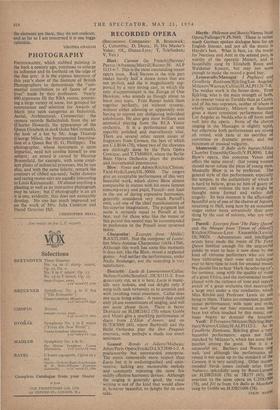RECORDED OPERA
Bizet : Carmen (in French)/Stevens/ Peerce / Albanese/Merrill/Re iner/H . ALP 1115-6-7. This is the most outstanding recent opera issue. Rise Stevens in the title part makes hardly half a dozen notes that are not perfect, and she is magnificently sup- ported by a very strong cast, in which the only disappointment is the Zuniga of Osie Hawkins, who sounds as though about to burst into tears. Fritz Reiner holds them together perfectly, yet without tyranny, without either allowing or apparently ever having to repress any disfiguring individual exhibitions. He also gets most brilliant and animated playing from the RCA Victor orchestra. It is a performance at once superbly polished and marvellously vital. There are several other recent issues of fragments from Carmen, the best of which are C.LB146 (78), where two of the choruses are dashingly done by the Paris Opera Comique, and T.TM68019, where the Berlin State Opera Orchestra plays the prelude and instrumental intermezzos.
Blow: Venus and Adonis/Ritchie/Clinton/ Field-Hyde/Lewis/OL.50004. The singers give an acceptable performance of this very beautiful work, which shows Blow almost comparable in stature with his more famous contemporary and pupil, Purcell=not least in the use of daring expressive harmonies, generally considered very much Purcell's oan, and one of the chief manifestations of his superior imagination. The poignant last scene is certainly equal to Purcell at his ,best, and for those who like the music of 'this period this record may be recommended in preference to the Purcell issue reviewed below.
Charpentier: Excerpts from Medee'l B.AXTL1049. Not the composer of Louise, but Marc-Antoine Charpentier (1634-1704). Although this work has some fine moments it does not, like the Blow, reveal a neglected genius. And neither the performance, under Nadia Boulanger, nor the recording is very satisfactory.
Donizetti: Lucia di Lammermoor/Callas/ Stefano/Gobbi/Serafin/C.33CX1131-2. Even generously cut, as it is here, Lucia is music- ally very tedious, and can delight only if sung with such virtuosity as to astonish and with ravishing vocal sweetness. Callas does not quite bring either. A record that could only phase connoisseurs of singing, and will not quite please them. There is better Donizetti on H.DB21612 (78) where Gobbi and Monti give a sparkling performance of duets from L'Elisir d'Amore, and on H.7ER5009 (45), where Barbirolli and the Halle Orchestra play the Don Pasquale overture, with perhaps a shade too much sentiment. Haydn: Philemon and BaucislVienna State Opera/Fallinger/V.PL7660. There is rather much German spoken dialogue here for an English listener, and not all the music is Haydn's best. What is best, i.e. the music for Narcissa and Aret in the second part, is worthy of the operatic Mozart, and is beautifully sung by Elizabeth Roon and Waldemar Kmentt, but may not seem enough to make the record a good buy. Leoncavallo/Mascagni: I Pagliacci and Cavalleria RusticanalBjiirlinglims Angeles/ M ilanov/Warren/Cellini/H.ALP1126-7-8. The weaker work is the better done. Even Bjorling, who is the Main strength of both, is in sweeter voice as Turiddu than as Canio, and of his two sopranos, neither of whom is wholly satisfactory, Milanov as Santuzza gives a more consistent performance than Los Angeles as Nedda,who is off form until well into the opera. Some of the chorus singing in the Maseagni is slightly tepid, but otherwise both performances are strong all round, with taste at no sacrifice of conviction or dramatic power, and the Minimum of musical vulgarity.
Monteverdi: 11 Ballo delle Ingrate/Milan Chamber Ensemble/Gerelli/V.PL8090. Like Blow's opera, this concerns Venus and offers the same moral: that young women should never refuse the pleas of young men, Musically Blow' is to be preferred. The general style of this performance, especially the tempos, in the authenticity of which it is hard to believe, gives no hint of gaiety or humour, and without the text it might be thought some formal and rather dull tragedy. Its best moment is the affectingly beautiful aria of one of the chorus of Ingrate, returning to Hell, sung here by an unnamed singer rather more attractively than any- thing by the cast of soloists, who are very poor. Purcell: Excerpts from `The Fairy Queen' and the Masque from `Tinton of Athens'/ Ritchie/Oiseau-Lyre Ensemble/Lewis/ OL.50029. Adventurous and intelligent artists have made the music of The Fairy Queen familiar enough for the ungrateful public to want to hear it now done by the • kind of virtuoso performers who arc too busy cultivating their tone and technique ever to have time to look for unusual music. We should like to hear 'Hark the echoing air', for instance, sung with the quality of voice of a great Elvira, and the instrumental music played with the richness of tone and superb attack of a great orchestra (not necessarily a large one) under a star conductor, which Miss Ritchie and Professor Lewis do not bring to them. Theirs are competent, profes- sional performances, with taste and style, but now that our finer musical sense has been too often touched by this music, our baser begins to demand the luxuries.


































 Previous page
Previous page